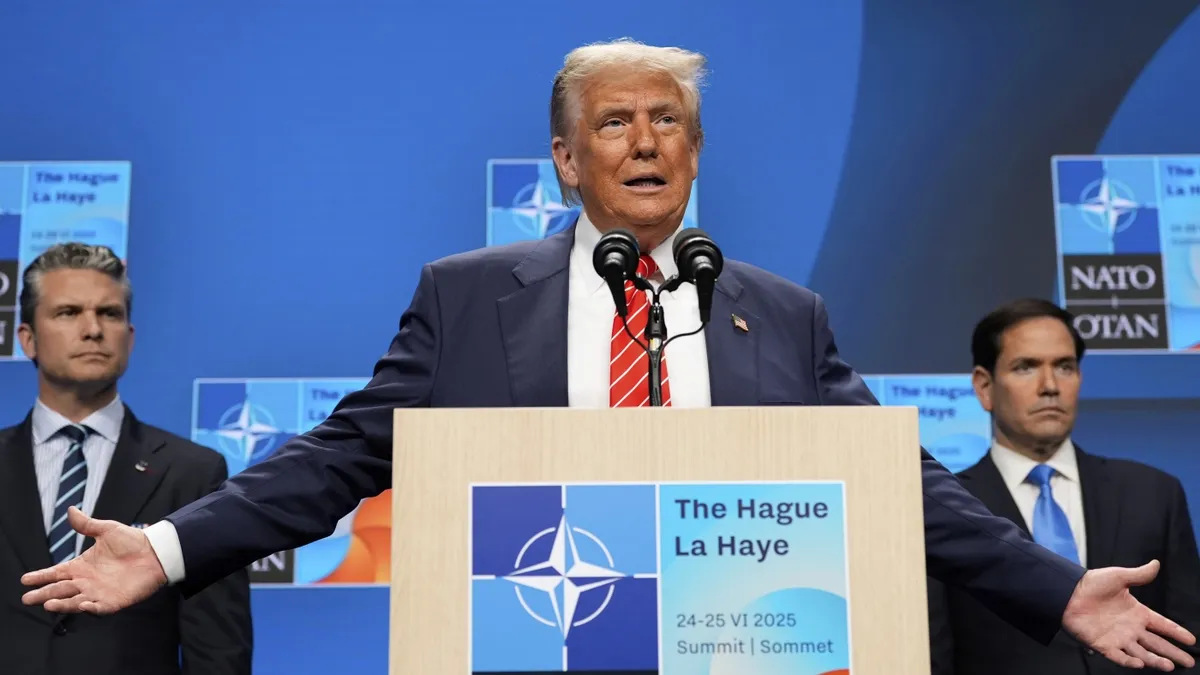
The NATO summit held in The Hague, Netherlands, on Wednesday has been characterized as a transformational and historic event. Finland's President, Alexander Stubb, noted that we are witnessing the birth of a new NATO. The 32 member nations of this global security alliance have endorsed a significant plan to ramp up defense spending, reverting to levels reminiscent of the Cold War. This shift is largely driven by U.S. President Donald Trump's influence and the growing concerns regarding the security threats posed by Russia.
The summit resulted in a nonbinding spending agreement that mandates a substantial budget increase for NATO's European members and Canada. This agreement is set to cost these nations tens of billions of dollars. In a major revamp of how NATO calculates defense budgets, the previous target of 2% of gross domestic product (GDP) is now being raised to 3.5% by 2035. Moreover, member nations will be allowed to include the cost of weapons and ammunition supplied to Ukraine in their calculations, thereby making the new target slightly easier to reach, though still challenging for Canada and several European countries grappling with economic issues.
In addition to this increase, NATO allies will allocate 1.5% of their GDP towards upgrading vital infrastructure such as roads, bridges, ports, and airfields necessary for army deployment. Funds spent on securing networks and preparing societies for potential future conflicts will also be included in this budget. The progress on these commitments will undergo a review in 2029, following the next U.S. presidential election. Notably, not all members are on board with these new directives; Spain has officially refused to sign the agreement, while Slovakia expressed reservations. Countries like Belgium, France, and Italy may face difficulties in meeting the new targets.
The leaders reaffirmed their unwavering commitment to NATO's collective defense clause, known as Article 5. In recent years, doubts had been sown by Trump regarding whether the U.S., NATO's most powerful member, would come to the aid of allies under attack. Trump had previously suggested that U.S. support would be contingent upon increased defense spending from other nations. Following the summit, he expressed satisfaction, stating, "I left there saying that these people really love their countries. It's not a ripoff. And we're here to help them protect their country." He further emphasized that NATO members want to protect their nations and that U.S. support is essential for their defense.
Since Russia's invasion of Ukraine, which initiated the largest land conflict since World War II in 2022, NATO summits have primarily focused on extending support to Kyiv. However, this summit marked a departure from that trend. The previous emphasis on Ukraine's membership prospects and integration into NATO was notably absent, with the final summit statement refraining from any mention of Ukraine's potential membership. Instead, leaders reiterated their commitment to support Ukraine.
Ukrainian President Volodymyr Zelenskyy attended the summit, engaging with other leaders at a dinner hosted by the Dutch king and holding discussions with various dignitaries, including Trump. While NATO's primary focus was on defense spending—a key concern for Trump—foreign ministers did convene on the sidelines with their Ukrainian counterpart in an official NATO-Ukraine Council meeting. In a minor victory for Ukraine and for allies needing to convince their citizens of the necessity for increased defense spending, Russia was identified as the primary security threat facing NATO.
This summit clearly illustrated that the United States remains the dominant force within NATO. The meeting was notably brief, with a streamlined one-page statement crafted to keep President Trump content and focused. Ahead of the summit, NATO Secretary-General Mark Rutte sent Trump a message expressing enthusiasm about the potential outcomes. Rutte was quoted saying, "Europe is going to pay in a BIG way, as they should, and it will be your win," a sentiment Trump later shared on social media. Rutte stood by his comments, asserting that they were true and not something to be embarrassed about.
After the summit's conclusion, Trump reflected on his initial perception of the gathering as a political obligation, stating he was leaving with the impression that the assembled leaders genuinely care about the alliance, their own nations, and most importantly, the United States.